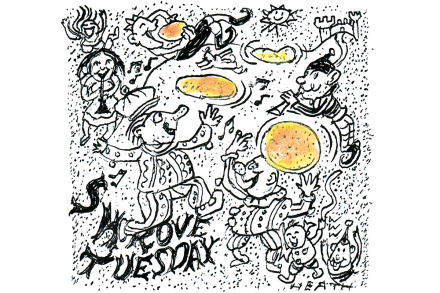Why did Shakespeare find pancakes so funny?
The English have been eating pancakes on Shrove Tuesday for a very long time. Originally it was a way of using up eggs before the Lenten fast: the Saturday before Ash Wednesday was called Festum Ovorum or Egg Saturday, when all the eggs would be collected in preparation for the pancake making. Shrovetide in early modern England was a time for mischief and merriment, a chance to indulge. Feasting, games and blood sports featured – especially cockerel throwing, whereby boys would charge passers-by to try to land a hit on a pinioned bird with a cudgel. On Shrove Tuesday the church bells rang out, calling parishioners to confess their sins





















